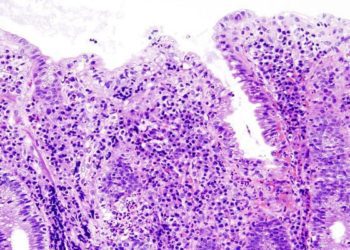Anti-TNF therapy for inflammatory bowel disease may induce skin lesions
1. From a retrospective single center cohort study, 29% of patients taking anti-TNF therapy for inflammatory bowel disease developed skin manifestations, most often psoriasiform eczema and eczema.
2. Of those who developed skin manifestations, 10.6% stopped therapy because of the skin lesions, and most lesions resolved upon discontinuation of therapy.
Evidence Rating Level: 2 (Good)
Study Rundown: Disease-modifying biologics such as anti-tumor necrosis factor (TNF) antibodies have been effective in the treatment of some cancers, infections and autoimmune diseases, like inflammatory bowel disease (IBD). This study sought to understand the frequency and characteristics of patients who developed skin manifestations associated with treatment with anti-TNF therapy, as well as how it affected adherence to therapy. This study found that nearly one-third of patients with IBD treated with anti-TNF antibodies developed skin lesions within two years after starting treatment. Most often these skin lesions were psoriasiform eczema or eczema occurring on the extremities, face, trunk and flexural regions. Skin lesions caused about 1 in 10 patients to stop treatment. Patients who developed skin lesions were more likely to be female, develop new autoimmune markers (i.e., ANA and anti-dsDNA) after beginning therapy and be younger at the time of IBD diagnosis or therapy initiation. Skin lesions appeared not to be related to cumulative dose of therapy taken per year. Bacterial super infections occurred in nearly a quarter of skin lesions. Of those who developed skin lesions from anti-TNF therapy, more than half required topical treatment, and one-third required systemic drugs. The major limitations of this study included its retrospective nature, the lack of matched-controls, uneven baseline patient characteristics and limited generalizability due to its single institution experience. Overall, it is clear that skin lesions may be an important consideration in the utilization of anti-TNF therapies in IBD.
Click to read the study published today in the Annals of Internal Medicine
Relevant Reading: Adverse Skin Reactions to Anti-TNF-Alpha Monoclonal Antibody Therapy
In-Depth [retrospective cohort]: This single-center cohort consisted of 917 European patients with IBD diagnosed at median age 24 years who began anti-TNF (infliximab) therapy at median age 36 years. The median follow-up after infliximab initiation was 3.5 years. Skin lesions developed in 264 (29%) of patients at a median of 11.6 years after diagnosis and 1.9 years after infliximab initiation. Those who developed skin lesions were younger at diagnosis (median 22 years vs. 25 years) and initiation of infliximab (median 32 years vs. 37 years). Of the 604 patients who received maintenance therapy, 230 (38%) developed skin manifestations during follow up, of which 178 were first noted during the maintenance therapy period. The cumulative dose and trough levels were similar between patients with and without skin lesions. The most common type of skin lesions were psoriasiform eczema (30.6%) and eczema (23.5%), but xerosis cutis (10.6%), palmoplantar pustulosis (5.3%), bacterial folliculitis (4.5%) and psoriasis (3.8%) also occurred in significant numbers. Twenty-eight patients (10.6%) stopped therapy because their lesions were intolerable due to location (i.e., face and scalp were less tolerable), itching or pain, and 17 had resolution within a median of 3 months of discontinuation.
Image: CC/Wiki
©2015 2 Minute Medicine, Inc. All rights reserved. No works may be reproduced without expressed written consent from 2 Minute Medicine, Inc. Inquire about licensing here. No article should be construed as medical advice and is not intended as such by the authors or by 2 Minute Medicine, Inc.





![Adverse pregnancy outcomes associated with thrombophilias [Classics Series]](https://www.2minutemedicine.com/wp-content/uploads/2015/07/Classics-2-Minute-Medicine-e1436017941513-75x75.png)